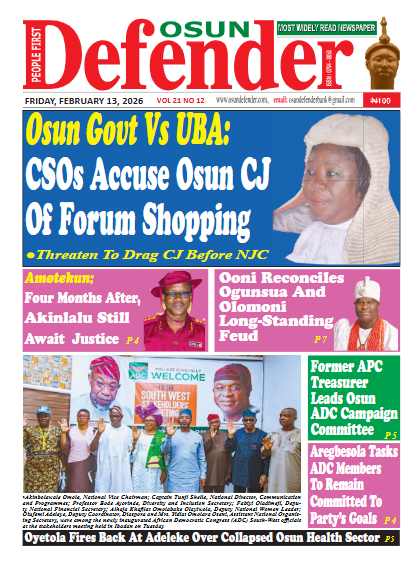STRIKER: How Difficult Is Doing The Right Thing?

THERE is no doubt that if Nigeria is to survive, we must all agree and restructure into a true federation, and soon at that! However, before the rebirth (or crumble, God forbid bad thing – a la OBJ) there are policy decisions, as clear as daylight, that can simplify our dangerously complex situation. Why the Presidency and Mr. President find them difficult to initiate bogs the mind. It makes one wonder who are the strategic thinkers and solution-finders, the proactive think-tank, of the Presidency. Are there even any?
Let us, for instance, take the grave insecurity situation in Nigeria, from genesis till date. It developed in stages from two separate component matters: religious extremism/terrorism and farmers/herders communal clashes localised around Borno, Plateau and Benue states. Those matters have become interwoven today but before they so became, what did the governments directly in charge of all apparatuses of state do to prevent the mushrooming? Little next to nothing and the little actually done only tended to fuel the conflagration.
Two governments have been challenged the most in recent history by the above phenomena; the six years PDP Government under Goodluck Jonathan and the 6 years APC government under Muhammadu Buhari. Before them, the greatest enemies known to the state were the Niger Delta militants, which threat was brilliantly simplified (but eventually mismanaged) in the amnesty programme initiated by President Shehu Musa Ya’Ardua. If the Jonathan government that inherited no more than that plus budding Boko Haram – as far as insecurity is concerned – is alleged as clueless and corrupt, what is to be said of a government of progressives that rode in on the wave of the change mantra and so much popular goodwill that for the first time in Nigeria’s history, an incumbent government at the national level was swept away?
Even leaving aside the APC manifestos and campaign promises, the question to ask is: what happened to creative thinking for innovative solutions, considering the calibre and pedigree of the managers at the disposal of APC, its Federal Government and National Legislative majority, however slim? Cattle ranching and animal husbandry is no rocket science and is not new in Nigeria. Rather than a recourse to the provocative and ill-fated Rural Grazing Area (RUGA) policy, a simple historical check would have shown the APC Federal Government that large-scale cattle ranching is as old in Northern Nigeria as the time of Amalgamation (1914), anchored by African Ranches Limited, a subsidiary of a Liverpool firm that later became part of the United African Company (UAC); and ranching was widespread all over the Western and Eastern Regions as well, from Saki all the way to Obudu! Several papers have since been written on the challenges that drove them into near-oblivion, key of which is simply archaic governance and retrogressive elite disposition over the decades. What does it cost a progressive government to change that disposition?
Striker once quoted from a recent Food and Agriculture Organisation’s publication “World Cattle Inventory: Ranking of 209 Countries,” and said that “the world has about 1.468billion cattle with Brazil as leader (211,764,292) followed by India, China and United States of America in that order. Nigeria is in 14th position with 20,000,000 cattle, with Ethiopia, Sudan and Tanzania ahead of us in Africa (54m, 41m and 24m cattle) in 5th, 7th and 11th position respectively. In none of the leading or lesser countries, Africa and beyond, is there any issue about cattle rearing leading to social crisis, much else violent crimes and human killings, except in Nigeria!”
If Federal Government led by the APC had done the needful in its first two years, having the mushrooming terrorist menace at the back of its mind, cattle rustling and farmer/herders clashes would not only have been stamped out or reduced to barest minimum, animal husbandry would have transformed into a multi-billion dollars economic sector providing millions of job along the value chains.
Once rustling and communal clashes are stemmed, there would be no hiding place for terrorism except to be dealt with as what it is -terrorism. Today, terrorism has a fancy cover in cattle rustling, which led to arming cattle herders, which led to brazing illegal occupation of farmlands and forests by terrorist (masquerading as bandits using herders as cover), which led to wanton violence against inhabitants (kidnapping, arson, etc), which led to secessionist agitations in the South-West and escalated it in the South-East, which has now led us to almost a failed state status and a grave threat to democracy and nation’s survival.
Almost all Nigeria’s statesmen and interest groups have condemned the baffling lethargy of the government and irresponsible indifference, and even complicity of some key state actors. Solutions – short-, medium- and long-terms are daily provided from several quarters – from former presidents to newsprint columnists. The mind-boggling question, while waiting for actions from a progressive party and a progressive President, before it is too late, is: how really difficult is it to simply do the right things?








